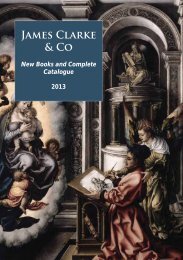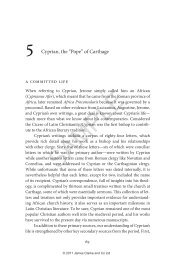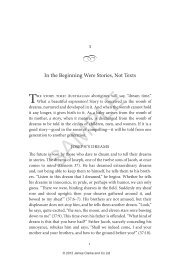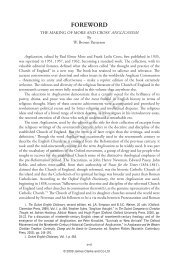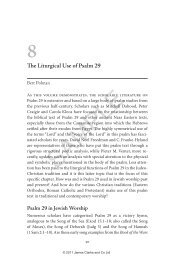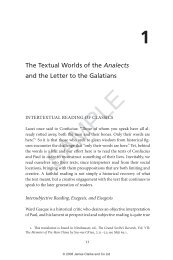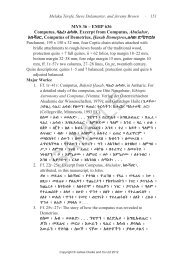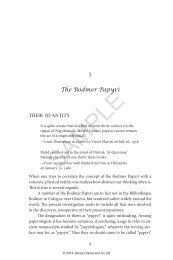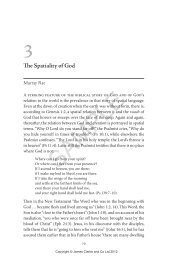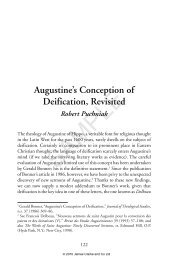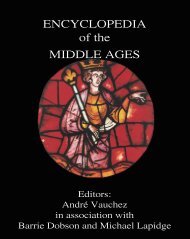Introduction by Kirk R. MacGregor - James Clarke and Co Ltd
Introduction by Kirk R. MacGregor - James Clarke and Co Ltd
Introduction by Kirk R. MacGregor - James Clarke and Co Ltd
Create successful ePaper yourself
Turn your PDF publications into a flip-book with our unique Google optimized e-Paper software.
<strong>Introduction</strong><br />
presented as an amalgamated whole, of everyone who puts their trust in<br />
Jesus. Buice relates this exposure to the pragmatic aspects of the larger<br />
Johannine Christology, which in part present Jesus as a divinely commissioned<br />
agent whose desire is to accomplish the Father’s will. Admitting<br />
that a specific group of people, “those he has given me,” are referred to in<br />
John 6:38–40, Buice follows R. C. H. Lenski <strong>by</strong> arguing that this concession<br />
does not dem<strong>and</strong> limiting the number of persons who can acquire<br />
salvation to a divinely pre-selected company. Rather, Buice interprets the<br />
further description of this group, “everyone who sees the Son <strong>and</strong> believes<br />
in him,” as a universal invitation which removes all religious <strong>and</strong> ethnic<br />
boundaries <strong>and</strong> places membership priority upon the hearer’s decision.<br />
St<strong>and</strong>ing in a Baptist tradition borne out of both Particular <strong>and</strong> General<br />
Baptist streams, Buice marshals John 6 as support for a view denominated<br />
“preservation of the saints,” which mediates between synergism <strong>and</strong> monergism<br />
<strong>by</strong> drawing a distinction between the steps in the ordo salutis for<br />
which the individual <strong>and</strong> God are primarily, but not exclusively, responsible.<br />
Moreover, Buice maintains that a “preservation” model carries with<br />
it the pastoral advantage of preparing believers to rely exclusively upon<br />
God’s strength for carrying out the good, so escaping the psychological<br />
damage caused <strong>by</strong> thrusting believers back upon themselves for the responsibility<br />
of achieving sanctification.<br />
Chapter four treats the divine counsels reached prior to the creation<br />
of the space-time universe, as revealed <strong>by</strong> the high-priestly prayer in<br />
John 17. Here Jon Balserak insists that, far from an esoteric consideration<br />
with no practical relevance, a proper underst<strong>and</strong>ing of these counsels is<br />
imperative for the believer’s security. Balserak sheds light on their significance<br />
<strong>by</strong> recalling the Patristic controversy between Heracleon ( fl.<br />
175), a Valentinian Gnostic who composed the first commentary on<br />
John’s Gospel, <strong>and</strong> the prominent early church leader, philosopher, <strong>and</strong><br />
exegete Origen (185–254). On the one h<strong>and</strong>, Heracleon proposed that, for<br />
John, faith in Christ was a matter predetermined <strong>by</strong> a person’s conception<br />
<strong>by</strong> either God or the devil. On the other h<strong>and</strong>, Origen responded in his<br />
own Johannine commentary that belief was a matter of human free will.<br />
Dissenting from Heracleon’s interpretation of the pre-temporal counsels<br />
while not necessarily agreeing with Origen, Balserak avers that John 17<br />
evinces an overarching covenant of redemption, whose parties are the<br />
Father <strong>and</strong> the Son sans any creaturely envoy. Established before the world’s<br />
foundation, this covenant stipulates that the Father will choose a people<br />
SAMPLE<br />
xxiii<br />
© 2011 <strong>James</strong> <strong>Clarke</strong> <strong>and</strong> <strong>Co</strong> <strong>Ltd</strong>



